Review: Lincoln MKZ
The logic behind the Lincoln MKZ is clear enough: if Toyota can get away with making a Lexus out of a Camry, why can’t Ford do the same with a Fusion? The ES 350 is arguably convincing as a Lexus (I’d argue pro, if not with much vigor, while there’s no shortage of people who’d take the other side). But does the MKZ make for a convincing Lincoln?
The MKZ spent one year as the Zephyr, and received a more thorough revision for 2010. Both the grille—Lincoln’s current twin waterfall—and the tail lamps have gotten larger, in the current fashion. Unlike with the Fusion’s tri-bar, the supersizing doesn’t hurt. But the grille does nothing for the side view, from which the MKZ, though handsome, appears much less distinctive. Even with bespoke
sheetmetal fore and aft of the doors, the midsize Lincoln sedan doesn’t look even as different from the Fusion as the ES does from the Camry. The money for dedicated fenders was not well spent—this is the way GM used to do it. If you’re going to spring for unique metal, spend a little more to alter the basic shape.
A larger problem: the MKZ doesn’t look much different than any other conventionally packaged three-box sedan. Ask a kid to draw a sedan, and he’d likely draw this. I dropped by a Buick showroom while driving this car, and the LaCrosse makes the MKZ appear just so twentieth century in comparison.
This story continues inside the MKZ. The Zephyr and pre-refresh MKZ had a three-quarter Town Car IP that, though certainly dated, was definitely Lincolnesque. There’s nothing remotely memorable about the new IP with the possible exception of the lighted hash marks that ring the instruments—a trait shared with other current Lincolns. Some other bits of style: the light gray piping on the steel gray seats and a tasteful level of chrome trim. The interior materials, while not those of a $41,000 car, are certainly better than those in the Fusion. The padded door panels are an especially welcome upgrade. But the Fusion should have door panels this nice, rather than the econo-car moldings it does have. A Lincoln interior should be nicer still. Beginning with the sound the doors make when pulled shut.
One dividend of the MKZ’s conventional packaging: good visibility to the front and sides. The thick-pillared, high-belted LaCrosse can’t touch it here. The front seats, though less cushy than those in the larger MKS, provide good lateral support. Together with the hand-operated parking brake, they suggest that we might even have a sport sedan on our hands. The rear seat, while fairly roomy, has on overly flat bottom cushion, for me among the least comfortable in any car.
Cargo is a strong point. Unlike in the MKS or the LaCrosse, the opening is as expansive as the trunk itself. Credit the conventional three-box shape. The hinges are the non-intrusive sort. And, for even more space, you can fold the rear seat. Can’t do that in a LaCrosse or a Lexus ES. One omission: no interior handle to close the trunk—you must touch the outer surface of the lid. Why?
A 263-horsepower 3.5-liter V6 remains the sole engine option. It’s no EcoBoost—if Ford offered that engine it could just put the MKZ on the enthusiast map—yet the sans-boost six is more than adequate. If you don’t want a little torque steer, you want the optional all-wheel-drive. Fuel economy in mildly aggressive suburban driving was about 18.5—almost the same as the larger, heavier, considerably more powerful all-wheel-drive MKS EcoBoost. Go figure. The six-speed automatic can be manually shifted, which can be handy on curvy or hilly roads.
Manually shift a Lincoln, really? The tested MKZ was fitted with an optional sport suspension that certainly livens things up. After a few days in an MKS, this MKZ felt like a Miata until my reference point readjusted. It’s taut.
Perhaps too taut. With the sport suspension, the MKZ’s ride quality is often jittery, and occasionally crosses the line into harsh. I don’t recall the Fusion Sport riding this firmly, though certainly it must have? With a Ford badge and tighter steering I might have found this ride/handling balance agreeable, at least on the right road. In a Lincoln it seems…inappropriate.
Noise levels are fairly low, but not MKS low. When I drove an MKS with the regular suspension and a Milan back-to-back a few years ago, I found that the former was notably smoother and quieter. Possibly because the typical mainstream sedan has gotten so much smoother and quieter in recent years, I didn’t get the same premium feeling this time around. If the Fusion isn’t this smooth and quiet, it ought to be.
Perhaps it’s time to change our perceptions of what a Lincoln should be? Problem is, we need something to change them to. Like the MKS, but to an even greater degree, the MKZ lacks a coherent, distinctive character. The MKS at least had the “big and cushy with tons of stuff” thing down pat. As much as I hate to say it, the MKZ is just a mildly upgraded Fusion. Not a bad car by a long shot, since the Fusion is a good, reliable basis to start from. And at the right price I’d gladly recommend the MKZ, and certainly wouldn’t kick one out of my garage. But the $41,355 on the tested car’s sticker is not the right price. To deserve that kind of money, Lincoln needs to offer something more special. Perhaps the most telling indicator: while my luxury-loving wife hated to see the MKS go back, she hasn’t missed the MKZ for a moment.
Ford provided the vehicle, insurance and one tank of gas for this review
Michael Karesh owns and operates TrueDelta, an online provider of automotive pricing and reliability data
Michael Karesh lives in West Bloomfield, Michigan, with his wife and three children. In 2003 he received a Ph.D. from the University of Chicago. While in Chicago he worked at the National Opinion Research Center, a leader in the field of survey research. For his doctoral thesis, he spent a year-and-a-half inside an automaker studying how and how well it understood consumers when developing new products. While pursuing the degree he taught consumer behavior and product development at Oakland University. Since 1999, he has contributed auto reviews to Epinions, where he is currently one of two people in charge of the autos section. Since earning the degree he has continued to care for his children (school, gymnastics, tae-kwan-do...) and write reviews for Epinions and, more recently, The Truth About Cars while developing TrueDelta, a vehicle reliability and price comparison site.
More by Michael Karesh
Latest Car Reviews
Read moreLatest Product Reviews
Read moreRecent Comments
- Honda1 It really does not matter. The way bidenomics is going nobody will be able to afford shyt.
- VoGhost Smart. EVs are pretty much at price parity with ICE already, esp. if you consider total costs of ownership, given how inexpensive EVs are to fuel and maintain.
- Jalop1991 I've read the book Car.Ford couldn't make and sell a bag of ice profitably and/or in any kind of timely manner.
- VoGhost For the same $50K, you could buy a REAL performance sedan that does 0-60 in
- Analoggrotto Ford wishes it could be Hyundai Kia Genesis.



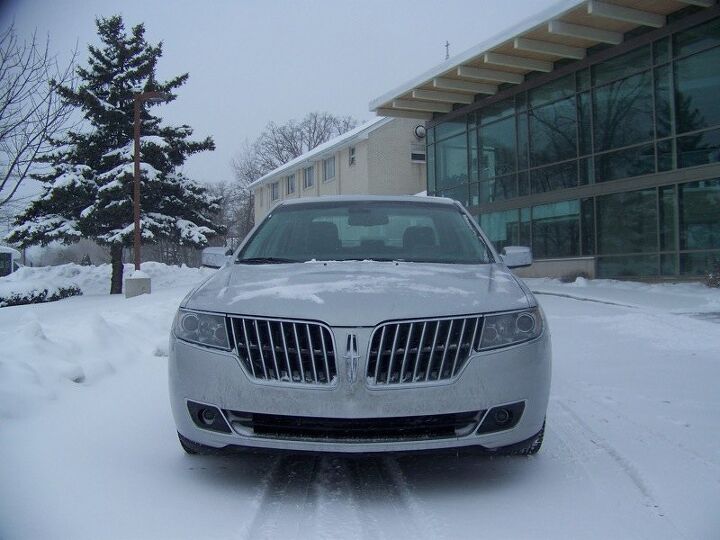






















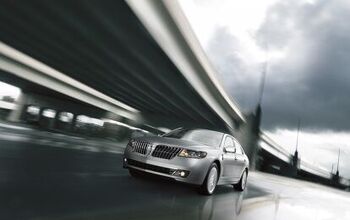
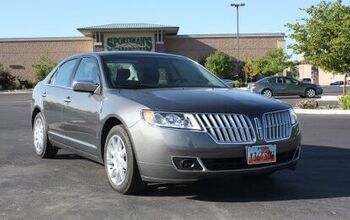
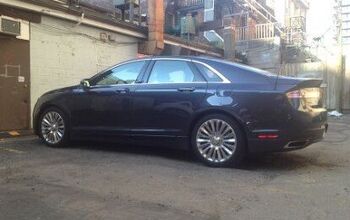
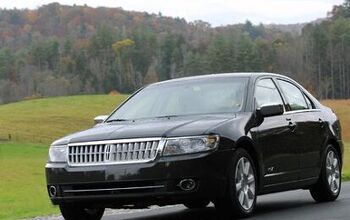
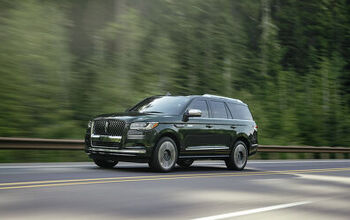










Comments
Join the conversation
you can't fold the rear seat on a Lexus ES? Really? My father's 2003 Camry has folding rear seats. Surely the ES would too.
Just got a CPO 2011 MKZ AWD I think there are two things that journalists and people in general love to rag on Lincoln and the MKZ about. One being that the MKZ is basically a shined up Ford Fusion, which is true, but the Fusion is a very good car to begin with and while this article and many users want to compare the Lexus/Toyota Camry/ES to the Lincoln/Ford MKZ/Fusion lets take another Japanese car manufacture in Honda for an example. I love Honda's they are reliable, get good gas millage, hold value, and in the past were known as performance tech savvy cars. While I liked the brand perception of Acura I found that they were 90% like their Honda sisters just like Ford/Lincolns. So why do journalists like having a field day over Lincoln, but with Acura they point it out but let it slide? Some would say Acura just has a better product compared to Honda or their competitors, but disagree since all of their cars are FWD, they ride on the same Civic, Accord, CR-V, and Pilot platforms and performance isn't a huge upgrade with Acura. Sound familiar? Now I am not saying Lincolns are better luxury cars than an Acura, but so much emphasis is put into how the Lincolns are too similar to the Fords, when one of the biggest volume luxury car manufacture does the same thing with Acura. Secondly is price, Lincoln put this on themselves. They are stuck between Buick and true luxury cars like Lexus and BMW. I think more people wouldn't mind a dressed up Fusion if it started sub $30k, but instead it started in the mid thirties which is where true luxury cars start and with some added features like THX sound and AWD the car easily runs $40k+. Here is where I come in. The MKZ is a full feature car and at $35K new its not worth the price, but with bad residual value the MKZ becomes a great 2nd owner car with its above average reliability and considering how many standard features you get. Is it Luxury? Its as luxury as Buick and Acura. It's a car that has better features and materials compared to Acura. For instance, would you rather have a 2011 TSX (4 or 6 cylinder) or a 2011 MKZ? I assume a lot of people will say the TSX, but for me the larger trunk, available AWD, better leather, more standard features like the V6 are too good to pass up on, plus driving around Westchester NY you see the roads littered with house moms driving BMW 3 series, Mercedes C class, or Acuras, for me its about being different. A course the stigma of driving a Lincoln is that your 65 years old, but I hope to turn heads when a 27 Asian male steps out of a MKZ.